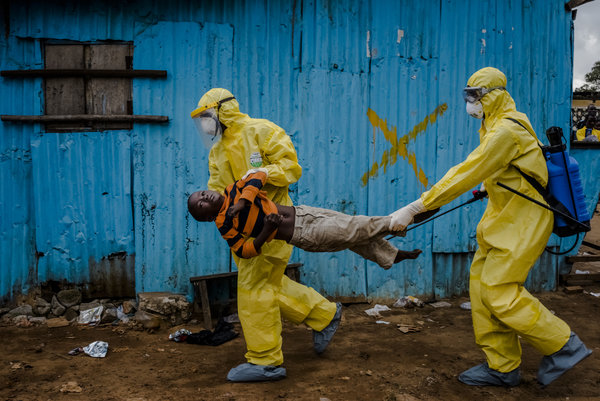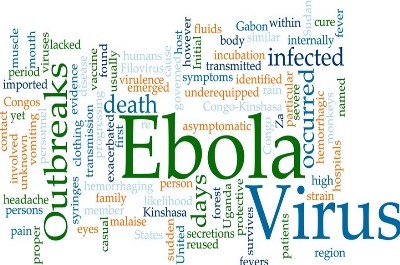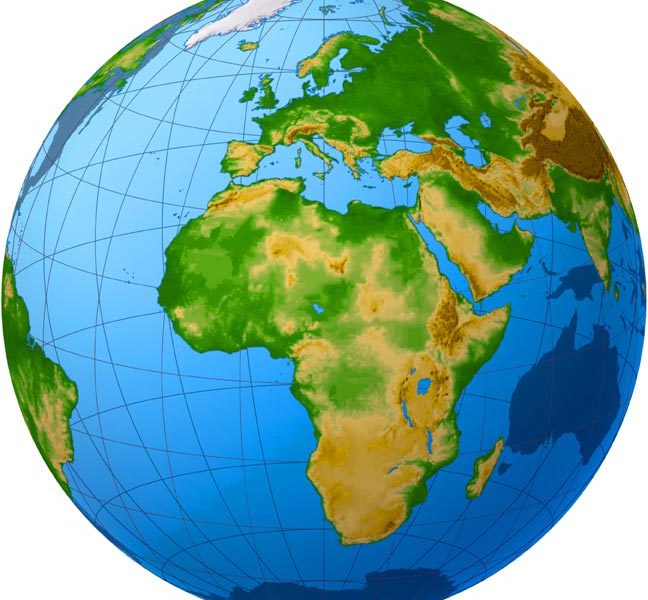UN press briefing in Geneva — excerpts on Ebola
REGULAR PRESS BRIEFING BY THE INFORMATION SERVICE
Corinne Momal-Vanian, Director of the United Nations Information Service in Geneva, chaired the briefing, which was attended by the Spokespersons for the International Organization for Migration, Office for the Coordination of Humanitarian Affairs, United Nations Refugee Agency, World Food Programme, Office of the High Commissioner for Human Rights, United Nations Development Programme, United Nations Children’s Fund, International Labour Organization, United Nations Conference on Trade and Development and the Human Rights Council.
Ebola
Antonio Vigilante, Deputy Special Representative of the Secretary-General for Recovery and Governance (UNMIL), speaking by phone from Monrovia, stated that the Ebola crisis differed from any other crisis in many ways. The needs could not be identified precisely, the distribution of aid was complicated and it would be hard for Liberia to recover economically and socially. In contrast to conventional disaster situations which could only improve, the Ebola crisis was still developing and worsening each day. Each three weeks, the number of new cases was doubling, resulting in a current amount of around 3,100 registered infected people.
Apart from the aspect of health, the epidemic was affecting Liberia in an economic way, most notably the poorest five percent of the population. That aspect gained particular importance as half of the Liberian population were living in extreme poverty. In many instances, the breadwinner of the family had died leaving others with no means to sustain themselves. Moreover, prices of food, gas or commodity, had increased slowly but steadily. Thus, it was forecasted that that the crisis would change the social fabric of Liberia, even if the extent of such an alteration remained uncertain.
While in recent years Liberia had been growing, the projections for 2014 had already been cut by half. Those estimates relied on the decrease of productivity of the mining and agricultural sectors and the concurrent dependency of Liberia on commodity exports. By now, revenues of the State had been reduced and were currently reducing further which created a deficit in the balance of payment. However, pledges of support from international donors had been recorded so that the risk of an inability to pay was averted.
Mr. Vigilante said that, still, there were huge needs for additional social protection and social security measures. The hardest hit groups were farmers and traders, particularly of agricultural products and bushmeat, which was a major source of protein for many Liberians. The trade of meat had been banned because it had been identified as one of the origins of the outbreak.
The international and humanitarian community would be obliged to step up efforts to distribute food to the affected population more efficiently. At the epicentre of Ebola crisis, there was a strong presence of the United Nations Mission in Liberia and the United Nations Development Programme, besides many other organizations, such as the World Health Organization, the World Food Programme and the United Nations Children’s Fund. Especially now, all organizations were actively engaged in approaches towards social mobilisation and community care.
Mr. Vigilante emphasised the need for international support, particularly since upcoming tasks, for instance the training of thousands of community workers for the purpose of providing care immediately in the communities, would be pretty challenging. On that note, the increase of health staff and most notably the provision of head staff were established as priority number one, since the amount of health staff for now covered only one tenth of the amount actually needed. Also, the acceleration of pledges, the flow of resources and the deployment of mobile laboratories were absolutely necessary to refill current gaps in supply.
Responding to questions, Mr. Vigilante stated that regular health workers were indeed coming in, but a lack of lack of specialised medical staff for the treatment of Ebola persisted. At the moment, the amount of specialised medical staff of all present organizations, including Medicines Sans Frontieres, culminated at around 150. Although he did not know the exact figures of nurses or currently trained Liberian health care workers, this number represented ten to twenty percent of the amount which was actually needed. The target was to increase the number of isolation beds to 2,000 and each bed required at least one medical staff member. The yet announced or implemented support, for instance from the African Union or the US was still insufficient in numbers of health staff provided. Simultaneously, it was hard to attract volunteers to support the work against Ebola.
In an answer to questions, Mr. Vigilante stressed again that in the current crisis, it was important to get as much medical staff as possible. Besides doctors, specialised nurses or assistants were extremely crucial for the fight against Ebola since its treatment was reliant not only on a specialised medical treatment, but also on the provision of Ebola-specific care. There had been a switch to a community-based approach which consisted of basic treatment training within communities.
Elisabeth Byrs, for the World Food Programme (WFP), stressed again that the Ebola was not just a health crisis, but it also had grave social and economic consequences that could spread far beyond only the affected country.
WFP was scaling up its emergency operation to provide food assistance within a package of care to more than one million people in Guinea, Liberia and Sierra Leone.
As of 14 September, WFP had provided around 3,300 metric tonnes of food to more than 180,000 people in the three countries. Food distributions were ongoing in both urban and rural areas, often house-to-house, one family at a time. In the month of September, a total of 1,520 metric tons of food had been delivered so far.
Ms. Byrs informed that some 350 WFP staff were working on the Ebola Response, as almost all employees from the three affected country had been redirected from their regular programmes to focus on the health crisis. More than 50 international staff had been deployed to Guinea, Liberia and Sierra Leone and to the coordination cell in Dakar.
WFP and partners had launched mobile vulnerability assessments to investigate the impact of the Ebola crisis on 2,400 families’ food security across the three affected countries. Due to the exceptional nature of the crisis and the challenges to access Ebola areas of intense and widespread transmission, families were being surveyed by phone calls or using SMS questionnaires. The results should provide precious early indicators before regular market monitoring and food security market assessment could take place.
Ms. Byrs said that in Guinea, the WFP was aiming to target 353,000 beneficiaries. Focus was to reach people in the Ebola epicentre in Forest Guinea, but other areas affected by the virus would be targeted as well.
WFP Liberia was responding to a government request for support with scale up of its emergency operation and would provide food to 405,000 people in areas of widespread and intense transmission of the Ebola virus over three months. All of the country’s 15 counties were targeted.
WFP Sierra Leone’s immediate priority was to provide food to the Ebola treatment centres, to the most vulnerable areas of the capital Freetown and to the priority epicenter areas of Kenema and Kailahun.
Regarding the funding, Ms. Byrs informed that the WFP had so far received only 13 per cent of the USD 126.9 million required for its global Ebola emergency operations until February 2015.
Christophe Boulierac, for the United Nations Children’s Fund (UNICEF), said that since August and up until today, UNICEF had sent nearly 550 metric tonnes of life saving supplies to treat patients and to protect health workers struggling to contain the Ebola Virus Disease outbreak in Guinea, Liberia and Sierra Leone.
The top supply items that UNICEF was providing included chlorine used to disinfect water, soap, and personal protection equipment, such as gloves, gowns, coveralls, safety glasses and face masks. Medicines such as analgesics, oral rehydration salts, and injectable fluids had also been vital to treat patients.
The previous weekend, UNICEF had begun the packing 50,000 household protection kits for Liberia. Those kits were designed for families taking care of loved ones at home. Each contained a bucket, gloves, face masks, soap, and thick garbage bags to dispose waste. The first batch of nearly 10,000 would leave Denmark this evening for Monrovia. It would take five planeloads to bring the total number of kits to Liberia by the end of October. Mr. Boulierac said that planning was underway for a second airlift of 50,000 kits for Liberia. Sierra Leone was also considering the possibility of ordering those kits.
Overall, since August, UNICEF had flown 47 cargo flights into those three countries. The air bridge of support was expected to continue, with at least 12 more airlifts, foreseen before the end of October. The total projected metric tonnes planned from now until the end of October was 760 metric tonnes.
UNICEF was providing supplies through the financial support and commitment from the Government of Japan, USAID, the Paul Allen Foundation and the World Bank. UNICEF also acknowledged the generosity and compassion of private citizens who supported UNICEF’s work.
Fadéla Chaib, for the World Health Organization (WHO), clarified figures released in the Situation reports from 19 September and 22 September. A difference had been noticed, with the former mentioning 74 cases of infected health workers in Sierra Leone and 31 deaths, whereas the latter Situation report referred to 96 cases and 61 deaths. Dr. Eric Nilles, epidemiologist, explained that the WHO was making substantial efforts to improve its data quality and epidemiological understanding with the overall view of really improving the response to the outbreak. A retrospective investigation had led to this increase in figures, which did not reflect a recent significant increase in transmission among health care workers. WHO was continuing to improve the characterisation of the epidemic in Sierra Leone.
Ms. Chaib informed that several short documents were now published, given that it was exactly six months since the WHO had been notified of Ebola first cases in Guinea. Those documents were entitled: «Ground zero in Guinea»; «A traditional healer and the funeral » about Sierra Leone; «Misery and despair, tempered by some good reason for hope» about Liberia; Nigeria and Senegal, stable for the moment», and «Democratic Republic of Congo: classical Ebola outbreak». Four more documents should be released the following day, as analysis of lessons to be learnt from the epidemic and projections of dealing with those kinds of crises in the future.
Ms. Momal-Vanian added that an advance team of the UN Mission for Emergency Ebola Response had arrived in Accra, Ghana, to set up the operation headquarters and another team had arrived to Liberia.
The webcast for this briefing is available here: … http://bit.ly/XUx92W
Stay with Sierra Express Media, for your trusted place in news!
© 2014, https:. All rights reserved.






